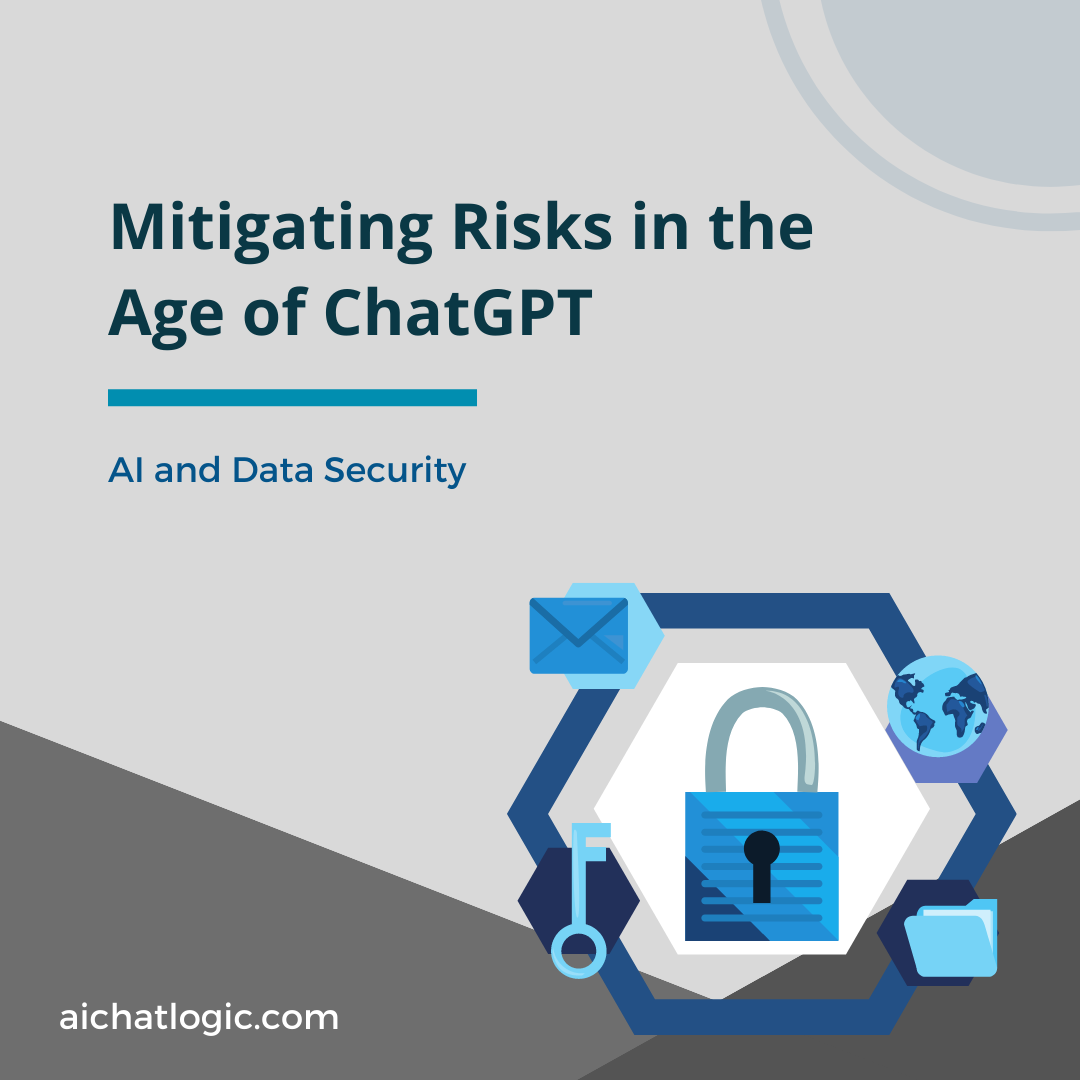The definition of securing AI data through encrypt, monitor, and access control involves implement measures to protect and preserve the confidentiality, integrity, and availability of data associated with artificial intelligence systems. Encryption ensures that data is encrypted and can only be accessed with the appropriate decryption keys. Monitor involves actively observing and analyzing data activities to identify any unauthorized access, unusual behavior, or potential security breaches. Access control establishes strict rules and permissions to limit who can access and manipulate AI data, reducing the risk of unauthorized use or malicious activity. Together, these practices aim to mitigate risks and safeguard sensitive AI data from unauthorized access or compromise.
Table of Contents:
- Introduction
- Understanding the Significance of AI and Data Security
- The Role of ChatGPT in the Digital Landscape
- Potential Risks Associated with AI and Data Security 4.1 Privacy Concerns and Data Breaches 4.2 Manipulation and Misinformation 4.3 Ethical Implications
- Strategies to Mitigate Risks in AI and Data Security 5.1 Robust Encryption and Data Protection Measures 5.2 Regular Security Audits and Updates 5.3 User Education and Awareness 5.4 Implement AI Governance Policies
- The Future of AI and Data Security
- Frequently Asked Questions (FAQs) 7.1 What is AI and why is it relevant to data security? 7.2 How does ChatGPT impact data security? 7.3 What steps can individuals take to protect their data in the age of ChatGPT? 7.4 Are there any legal regulations in place to address AI and data security concerns? 7.5 How can organizations ensure ethical AI practices to safeguard data?
- Conclusion
1. Introduction
In the modern digital landscape, Artificial Intelligence (AI) has emerged as a powerful tool, revolutionizing various industries and reshaping how we interact with technology. However, with the increasing prominence of AI, concerns regarding data security have become more prevalent. So, This article explores the topic of AI and data security, with a particular focus on mitigating risks in the age of ChatGPT.
2. Understanding the Significance of AI and Data Security
AI technologies, such as ChatGPT, have the ability to analyze vast amounts of data, learn from it, and generate human-like responses. This opens up new possibilities for enhanced customer experiences, improved productivity, and streamlined decision-making. However, it also introduces potential risks to data security and privacy.
3. The Role of ChatGPT in the Digital Landscape
Absolutely! As an advanced language model developed by OpenAI, ChatGPT is designed to engage in conversation and generate coherent text responses. Moreover, it employs a wide range of transition words to enhance the flow and cohesiveness of its generated text. Whether it’s introducing a new idea, providing examples, or emphasizing a point, ChatGPT strives to use appropriate transition words to ensure smooth and natural communication.
It has gained significant attention for its ability to mimic human-like interactions and provide accurate information. As, ChatGPT interacts with users, it collects and processes data, raising concerns about how this information is handled and protected.
4. Potential Risks Associated with AI and Data Security
4.1 Privacy Concerns and Data Breaches
As AI models like ChatGPT rely on large datasets for training, the privacy of user data becomes a critical concern. Without appropriate safeguards, sensitive information shared during conversations could be vulnerable to unauthorized access or misuse. Data breaches can result in reputational damage, financial loss, and compromised user trust.
4.2 Manipulation and Misinformation
While ChatGPT aims to provide helpful and accurate information, it is not immune to manipulation. There is a risk of malicious actors exploiting AI systems to spread misinformation or engage in social engineering attacks. This poses challenges in ensuring the reliability and integrity of information exchanged through AI-powered platforms.
4.3 Ethical Implications
AI and data security also raise ethical considerations. Issues such as bias in training data, algorithmic fairness, and transparency in decision-making need to be addressed to ensure responsible AI development. Failing to do so could perpetuate discriminatory practices and erode public trust in AI systems.
5. Strategies to Mitigate Risks in AI and Data Security
5.1 Robust Encryption and Data Protection Measures
To safeguard sensitive user data, encryption protocols should be implement to secure information both at rest and in transit. This helps prevent unauthorized access and protects against potential data breaches. Additionally, robust data protection measures, such as access controls and regular security audits, should be implement to ensure data integrity.
5.2 Regular Security Audits and Updates
Continual monitor, assessment, and updating of AI systems are essential to identify and patch vulnerabilities promptly. Regular security audits help detect any weaknesses or potential risks, enabling organizations to take proactive measures to strengthen their data security infrastructure.
5.3 User Education and Awareness
Empowering users with knowledge about AI and data security can enhance their ability to make informed decisions and protect their personal information. Additionally, providing clear guidelines on data collection, storage practices, and user control can help establish trust and promote responsible data handling. By incorporating comprehensive transparency measures, such as detailed privacy policies and consent mechanisms, individuals can gain confidence in the organizations handling their data. Furthermore, fostering open dialogue and offering educational resources can further bolster user awareness and encourage proactive measures to safeguard sensitive information.
5.4 Implementing AI Governance Policies
Organizations should develop comprehensive AI governance policies that outline ethical guidelines for the use and deployment of AI technologies. Moreover, these policies should encompass data protection measures, algorithmic transparency, and accountability frameworks to ensure responsible AI practices throughout the organization. By implement robust governance frameworks, organizations can proactively address potential risks and biases associated with AI systems. Additionally, clear guidelines can help guide decision-making processes and establish a culture of ethical AI development and deployment. This, in turn, promotes transparency, fairness, and accountability in utilizing AI technologies, ultimately fostering public trust and confidence in the organization’s AI initiatives.
6. The Future of AI and Data Security
As AI continues to advance, the need for robust data security measures will become increasingly crucial. Technological advancements, such as federated learning and differential privacy, offer promising solutions to mitigate risks associated with AI and data security. It is imperative for stakeholders to collaborate and develop innovative strategies that balance innovation with data protection.
7. Frequently Asked Questions (FAQs)
7.1 What is AI and why is it relevant to data security?
Ans: Furthermore, AI refers to the simulation of human intelligence in machines that can learn, reason, and make decisions. It is relevant to data security as AI systems often handle and process sensitive user information, requiring safeguards to protect data privacy.
7.2 How does ChatGPT impact data security?
Ans: ChatGPT collects and processes user data during conversations
Additionally, organizations must prioritize privacy and adopt extra security measures to mitigate potential risks associated with data handling.
7.3 What steps can individuals take to protect their data in the age of ChatGPT?
Ans:Furthermore, individuals can protect their data by being cautious about sharing sensitive information, using strong and unique passwords, enabling two-factor authentication, and regularly reviewing privacy settings on platforms that utilize AI technologies like ChatGPT.
7.4 Are there any legal regulations in place to address AI and data security concerns?
Ans:
Moreover, various jurisdictions have introduced or are considering regulations related to AI and data security. Therefore, it is important for organizations to stay updated with the evolving legal landscape and ensure compliance with relevant laws and regulations.
7.5 How can organizations ensure ethical AI practices to safeguard data?
Ans: Additionally, organizations can ensure ethical AI practices by implement guidelines for responsible data handling, incorporating diversity and fairness in training data, conducting regular audits, and fostering a culture of transparency and accountability.
8. Conclusion
As AI, particularly ChatGPT, continues to evolve and play an increasingly significant role in our lives, addressing data security risks becomes paramount. By implement robust encryption, regular security audits, user education, and responsible AI governance policies, organizations and individuals can mitigate potential risks and foster a secure environment in the age of AI. It is crucial to strike a balance between innovation and data protection to harness the full potential of AI while upholding privacy and security standards.












+ There are no comments
Add yours